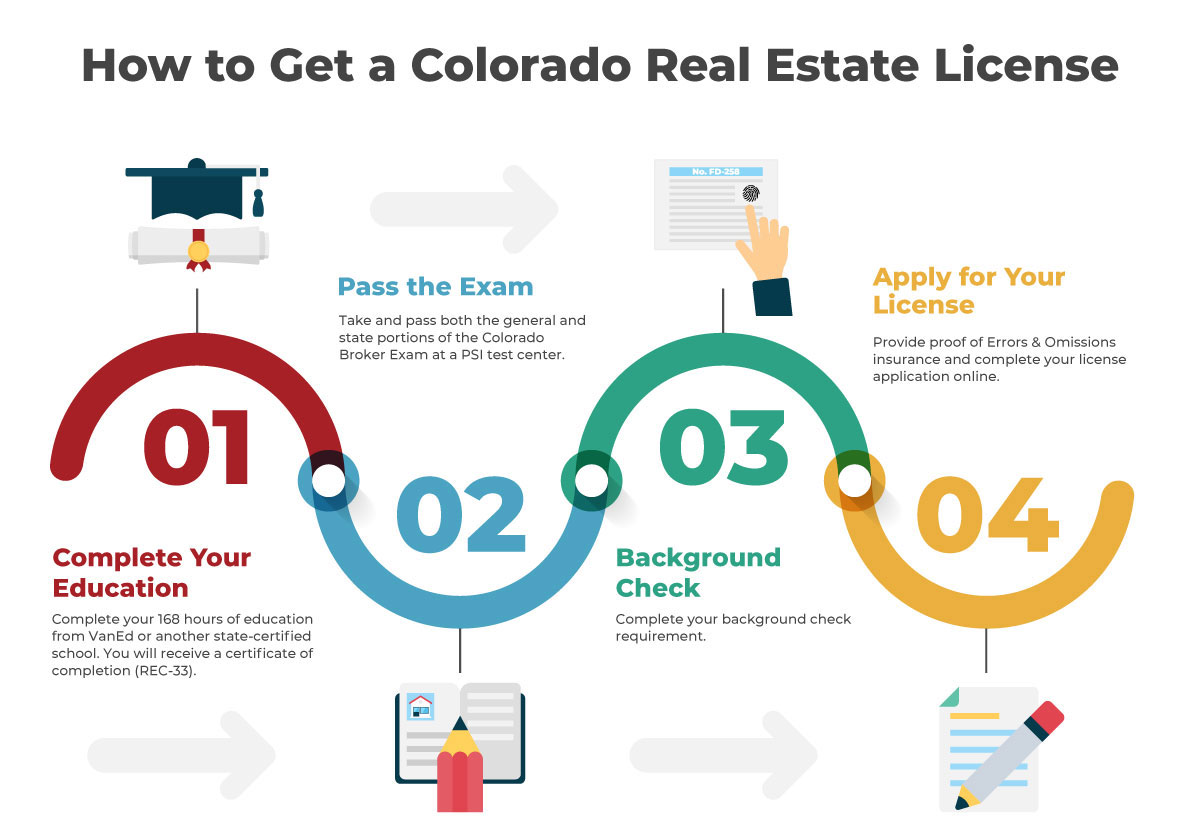
Minnesota has a number of requirements that you must meet to be eligible for a real-estate license. Minnesota Commerce Department works to ensure real estate agents have the necessary qualifications and are able to work in the State. The requirements for real estate agents include having to be at the least 18 years of age, being U.S. citizens and lawfully admitted aliens. Although citizenship is not an issue for most people, it could be a problem for those with criminal histories, unpaid judgments or disciplinary actions that are against their professional license. Unlicensed real estate activity is also a reason to not be granted a real estate license.
Pre-license education
Pre-license education in Minnesota is an essential part of becoming a licensed agent. It can increase your chances to pass the exam and prevent you from having to retake it. License as a Minnesota real-estate agent takes around four months. Pre-licensing is contingent on passing the exam, passing the education course and being sponsored by a licensed brokerage.
Online pre-license courses are a great way to get your Minnesota real estate license. Three courses lasting 30 hours can be completed to help you obtain your license. These courses cover topics such as real estate principles, valuation, contracts, financing, and more. The course can also be completed online via ContinuingEd Express. They offer live streaming and online courses.

Continuing education requirements
Minnesota real-estate salespeople must complete a minimum of fifteen hours annually in continuing education. Over a two-year period, that's 30 hours. You have many options to fulfill the real estate CE requirements, including live classes and on-demand webinars. Kaplan offers both online and live courses to fulfill the state’s continuing education requirements. Kaplan's online courses qualify for real estate CE credit of 3.75 hours.
Minnesota Real Estate Commission adopts a new system for real-estate CE credit. Real estate licensees must take at least eight hours worth of continuing education per day. However, they can only complete no more that 15 hours within 24 hours. To meet Minnesota's continuing educational requirements, salespeople and brokers must complete a prelicensing CE course each year. These courses give 3.75 hours of CE credit. They must also be completed by June 30, 2022. An MNR Academy website allows you to complete a course online without the need for a live instructor. While most courses can be completed on your own, some are streamed live. Exam prep courses include both the national exam and the state portion of the Minnesota licensing exam.
Exam
To be able to practice real estate in Minnesota, you must pass the Minnesota Real Estate License Exam. This exam helps to protect the public as it ensures that each person has a certain level or competence. The state regulatory agency sets a standard for safe practice, and the examination is designed to verify whether an individual complies with that standard. Pearson VUE administers the Minnesota real estate licensing exam.
A real estate license in Minnesota requires applicants to have completed a prelicense education course as well as a state exam. The state requires that applicants be at least eighteen years of age and a lawful permanent resident of the United States. Minnesota has reciprocity agreement with several states, including Wisconsin. If you are a licensed agent in a reciprocal state, you do not have to complete a prelicensing course in Minnesota. You can submit a request through the PULSE Portal. Once you have received a letter from them certifying your current licence, you will be able to pass the state part of the exam. In Wisconsin, however, you must take a 13-hour Wisconsin-to-Minneseta prelicensing course.

Cost
The first step in becoming a real estate agent in Minnesota is to obtain a real estate license. The entire process is done online with the exception of taking the actual exam. This article will discuss the process and give details about the costs and the time required. We will also discuss the exam content and provide you with some resources for more information.
Minnesota law requires all real estate agents to complete at least 90 hours pre-licensing education. These courses can be taken online or in a classroom setting. Online courses on demand are often the cheapest. A typical package includes three courses, which typically costs between $200 and $300.
FAQ
What are the 3 most important considerations when buying a property?
When buying any type or home, the three most important factors are price, location, and size. Location is the location you choose to live. Price refers the amount that you are willing and able to pay for the property. Size refers the area you need.
Which is better, to rent or buy?
Renting is generally less expensive than buying a home. However, you should understand that rent is more affordable than buying a house. There are many benefits to buying a home. For instance, you will have more control over your living situation.
What is the maximum number of times I can refinance my mortgage?
This will depend on whether you are refinancing through another lender or a mortgage broker. In both cases, you can usually refinance every five years.
What are the cons of a fixed-rate mortgage
Fixed-rate loans are more expensive than adjustable-rate mortgages because they have higher initial costs. Additionally, if you decide not to sell your home by the end of the term you could lose a substantial amount due to the difference between your sale price and the outstanding balance.
Statistics
- Some experts hypothesize that rates will hit five percent by the second half of 2018, but there has been no official confirmation one way or the other. (fortunebuilders.com)
- It's possible to get approved for an FHA loan with a credit score as low as 580 and a down payment of 3.5% or a credit score as low as 500 and a 10% down payment.5 Specialty mortgage loans are loans that don't fit into the conventional or FHA loan categories. (investopedia.com)
- Over the past year, mortgage rates have hovered between 3.9 and 4.5 percent—a less significant increase. (fortunebuilders.com)
- This seems to be a more popular trend as the U.S. Census Bureau reports the homeownership rate was around 65% last year. (fortunebuilders.com)
- Based on your credit scores and other financial details, your lender offers you a 3.5% interest rate on loan. (investopedia.com)
External Links
How To
How to Manage a Rental Property
While renting your home can make you extra money, there are many things that you should think about before making the decision. These tips will help you manage your rental property and show you the things to consider before renting your home.
Here's how to rent your home.
-
What are the first things I should consider? Take a look at your financial situation before you decide whether you want to rent your house. You may not be financially able to rent out your house to someone else if you have credit card debts or mortgage payments. Also, you should review your budget to see if there is enough money to pay your monthly expenses (rent and utilities, insurance, etc. It might not be worth the effort.
-
How much does it cost to rent my home? Many factors go into calculating the amount you could charge for letting your home. These include things like location, size, features, condition, and even the season. It's important to remember that prices vary depending on where you live, so don't expect to get the same rate everywhere. Rightmove reports that the average monthly market price to rent a one-bedroom flat is around PS1,400. This would translate into a total of PS2,800 per calendar year if you rented your entire home. While this isn't bad, if only you wanted to rent out a small portion of your house, you could make much more.
-
Is it worthwhile? You should always take risks when doing something new. But, if it increases your income, why not try it? It is important to understand your rights and responsibilities before signing anything. Renting your home won't just mean spending more time away from your family; you'll also need to keep up with maintenance costs, pay for repairs and keep the place clean. Before you sign up, make sure to thoroughly consider all of these points.
-
What are the benefits? So now that you know how much it costs to rent out your home and you're confident that it's worth it, you'll need to think about the advantages. There are many reasons to rent your home. You can use it to pay off debt, buy a holiday, save for a rainy-day, or simply to have a break. You will likely find it more enjoyable than working every day. If you plan well, renting could become a full-time occupation.
-
How do I find tenants? After you have decided to rent your property, you will need to properly advertise it. Start by listing online using websites like Zoopla and Rightmove. You will need to interview potential tenants once they contact you. This will allow you to assess their suitability, and make sure they are financially sound enough to move into your house.
-
How can I make sure I'm covered? You should make sure your home is fully insured against theft, fire, and damage. You will need insurance for your home. This can be done through your landlord directly or with an agent. Your landlord will likely require you to add them on as additional insured. This is to ensure that your property is covered for any damages you cause. This does not apply if you are living overseas or if your landlord hasn't been registered with UK insurers. In this case, you'll need to register with an international insurer.
-
You might feel like you can't afford to spend all day looking for tenants, especially if you work outside the home. However, it is important that you advertise your property in the best way possible. You should create a professional-looking website and post ads online, including in local newspapers and magazines. Also, you will need to complete an application form and provide references. Some people prefer to do everything themselves while others hire agents who will take care of all the details. Interviews will require you to be prepared for any questions.
-
What do I do when I find my tenant. If you have a lease in place, you'll need to inform your tenant of changes, such as moving dates. If this is not possible, you may negotiate the length of your stay, deposit, as well as other details. Keep in mind that you will still be responsible for paying utilities and other costs once your tenancy ends.
-
How do I collect the rent? When it comes to collecting the rent, you will need to confirm that the tenant has made their payments. If not, you'll need to remind them of their obligations. Before you send them a final invoice, you can deduct any outstanding rent payments. You can always call the police to help you locate your tenant if you have difficulty getting in touch with them. The police won't ordinarily evict unless there's been breach of contract. If necessary, they may issue a warrant.
-
How can I avoid problems? You can rent your home out for a good income, but you need to ensure that you are safe. Make sure you have carbon monoxide detectors installed and security cameras installed. Check with your neighbors to make sure that you are allowed to leave your property open at night. Also ensure that you have sufficient insurance. Finally, you should never let strangers into your house, even if they say they're moving in next door.